Mudroom tiles ideas – how to choose hardwearing tiles for your space
Be inspired by mudroom tiles ideas that make a functional area fabulous, too

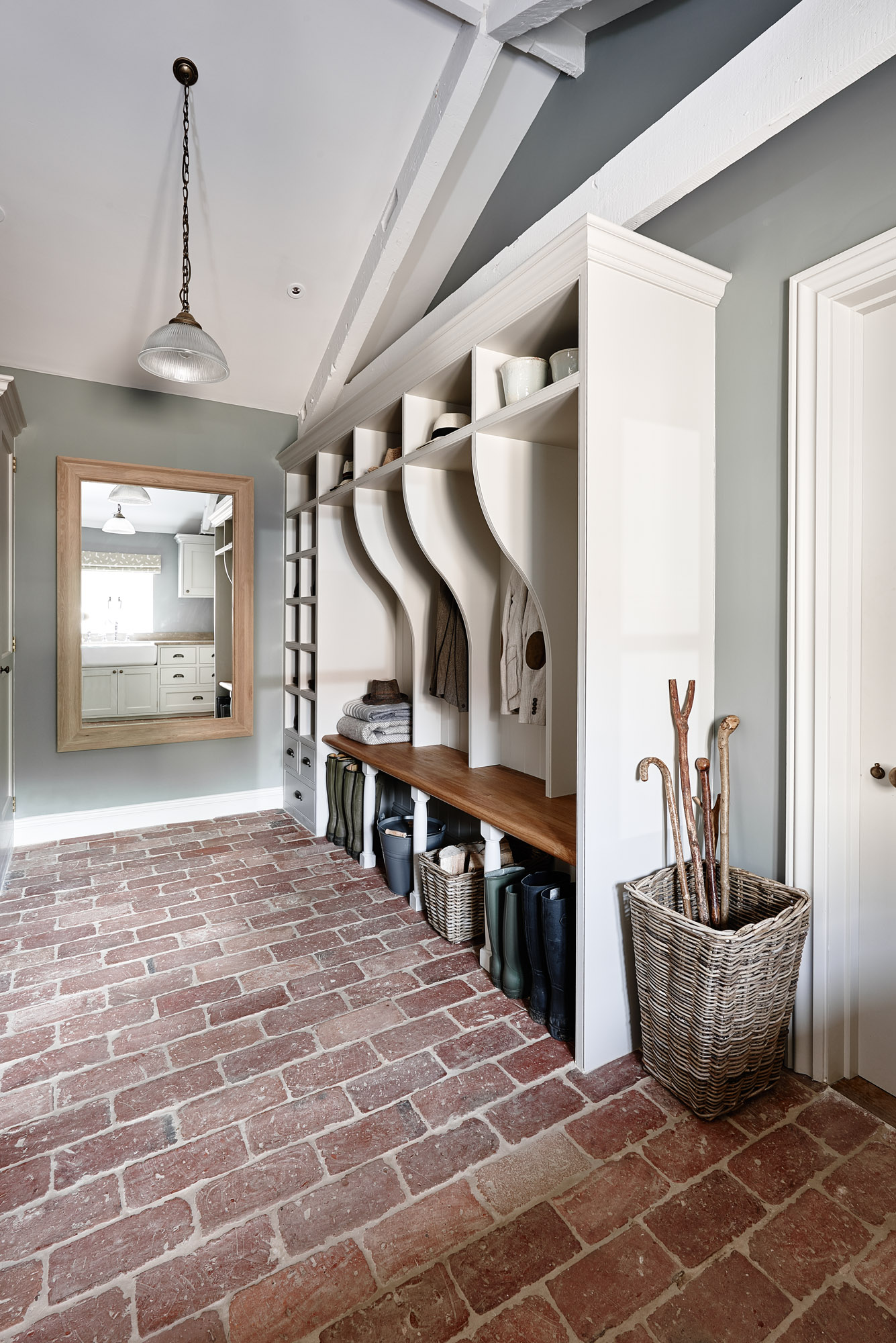
Mudroom tile ideas need to deliver on two counts. The first is practicality, so that they cope with the dirt and damp of shoes, boots, sports equipment, and outdoor clothes.
The second is aesthetic because this useful space should have flooring that’s good looking as well as hardwearing and easy to clean. And it’s a goal that’s easy to accomplish with tile which offers a wealth of options, colors, and even the opportunity to use pattern.
The best mudroom ideas are as carefully considered as the design choices you make for the rest of your interiors, and below we bring you the mudroom tile ideas that will complete the stylish picture.
Mudroom tile ideas
Your choices are wide when gathering mudroom tile ideas, and include both natural stone floor tiles and manufactured materials, and both plains and patterns. All offer the possibility of a handsome floor that will stand up to family life, and be easy to clean of the dirt, moisture, and debris adults, kids, and pets bring inside.
1. Select a natural, mudroom tile lookalike
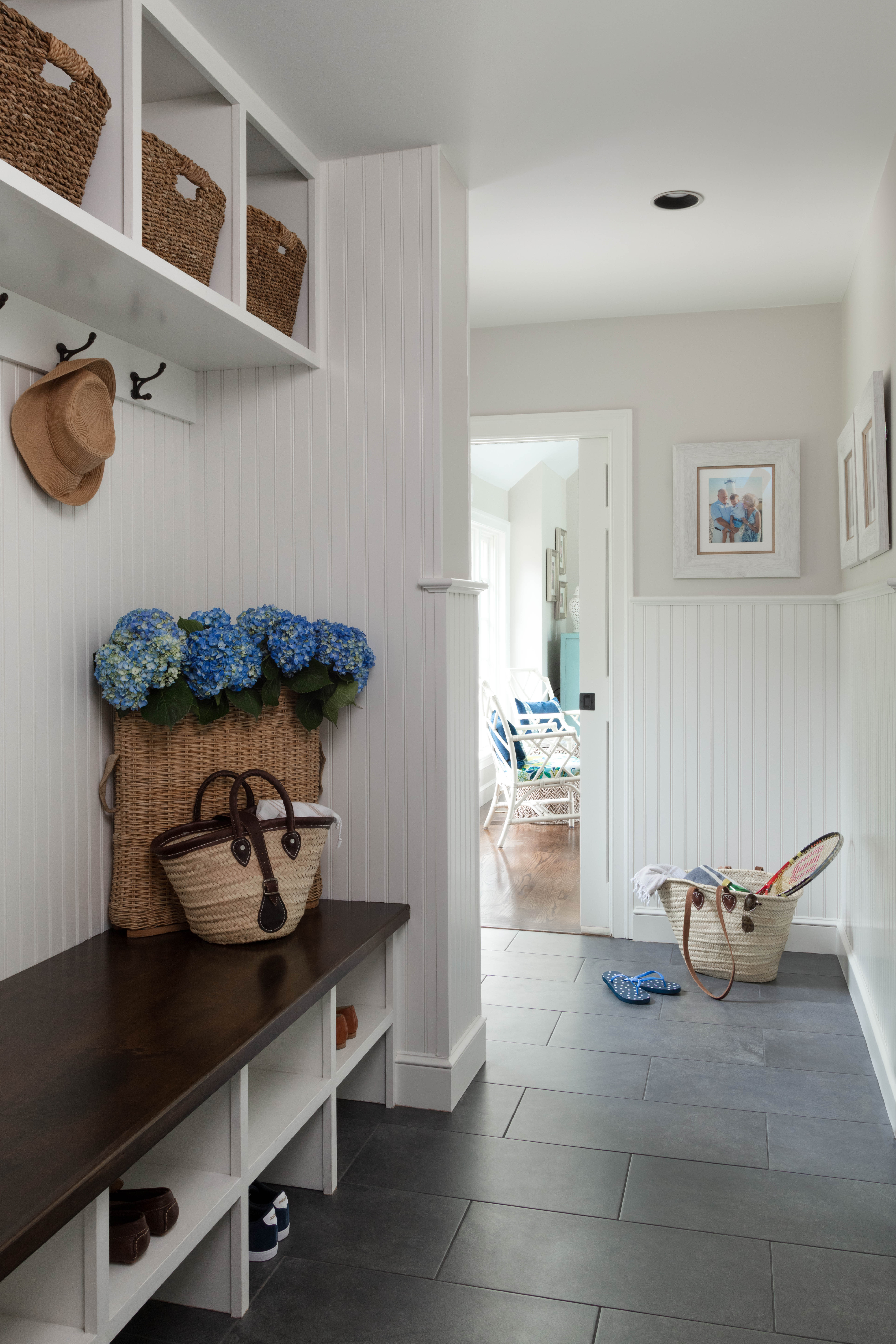
The most important piece of advice for anyone designing a mudroom is to choose surfaces that are easy to clean and low maintenance. If you’re concerned about maintaining a natural stone tile but love the look, one of the best mudroom tile ideas is to get an authentic lookalike that won’t need resealing. Porcelain can emulate real stone beautifully and is a low maintenance choice.
‘The porcelain tile in this mudroom resembles natural stone, minus the care and maintenance,’ says Mary Maloney of Bee’s Knees Interior Design Studio. ‘Porcelain tile is extremely durable. It will withstand wear and tear in high traffic areas. Perfect for this home and the busy family that lives within, and their furry friends too.’
2. Brighten up with pattern
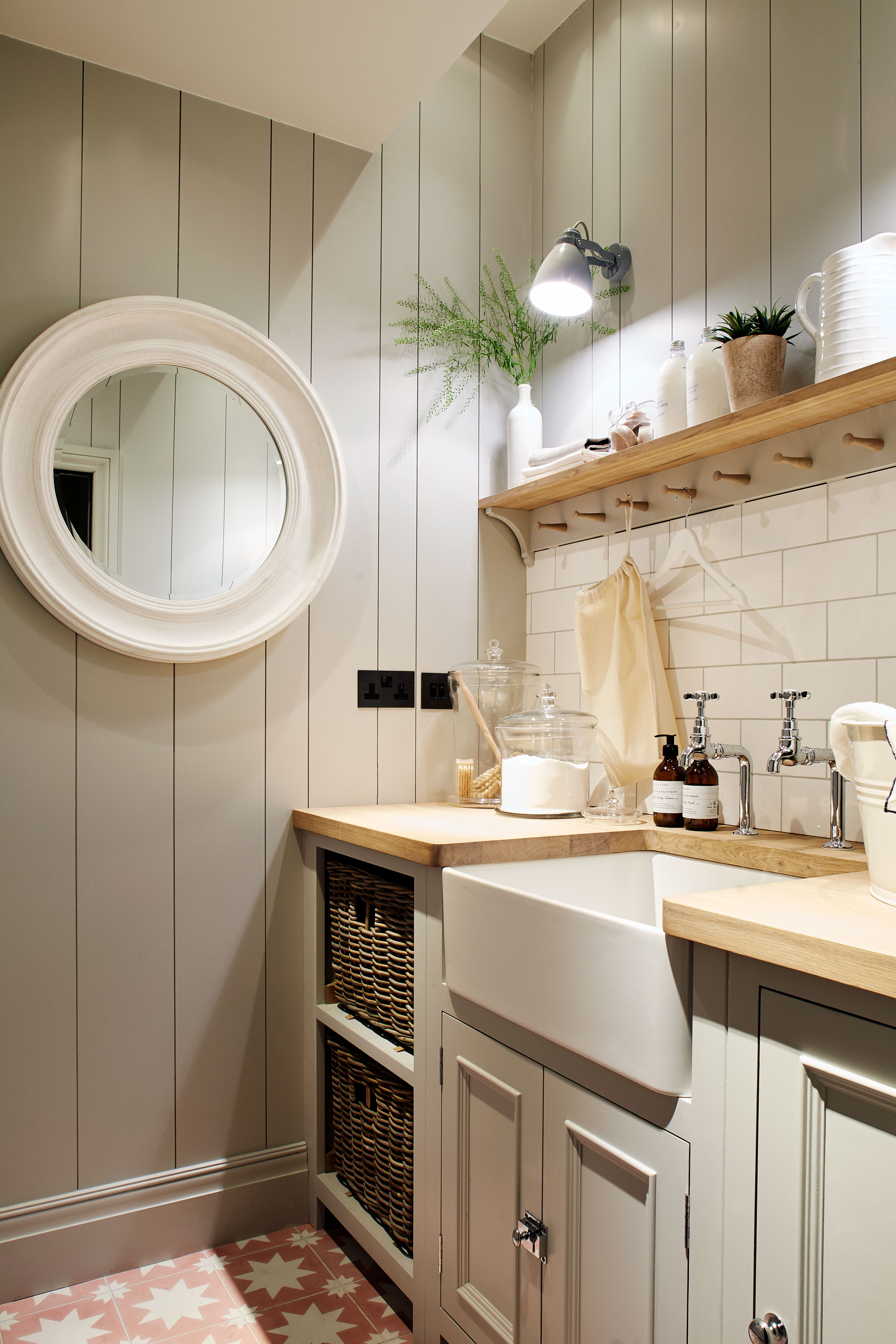
Mudroom storage ideas – built-in cabinets, cubbies, benches, and more – frequently don’t offer the wall space to create individual decorative touches, but you can choose tile to do just that.
Design expertise in your inbox – from inspiring decorating ideas and beautiful celebrity homes to practical gardening advice and shopping round-ups.
Ceramic, cement, and porcelain tile with a geometric design makes an attractive as well as practical flooring for a mudroom. Follow the lead of this design with a pink shade that adds an unexpected and pretty note to a hard-working room.
3. Make a tile floor warm
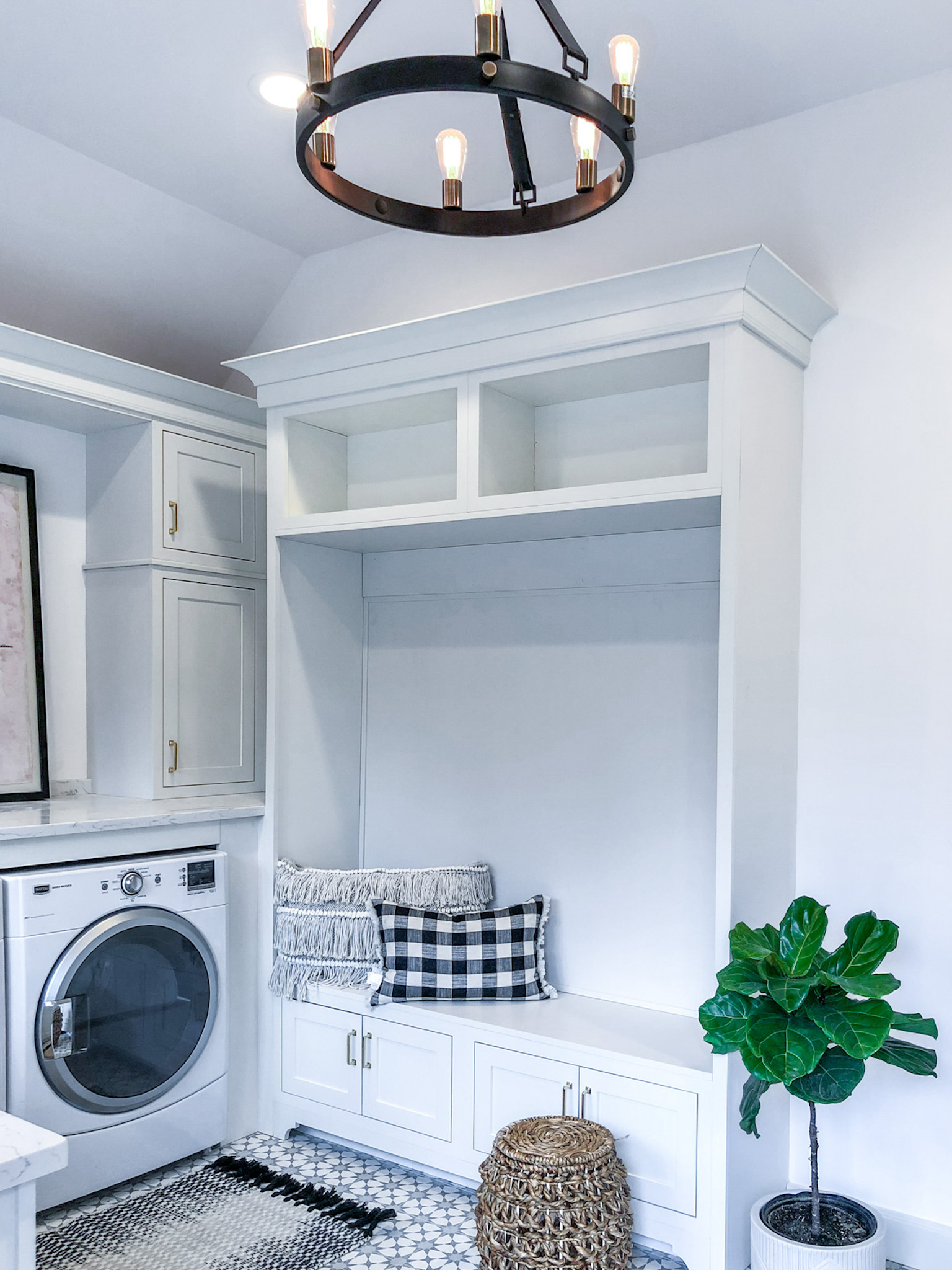
Tile is the ideal flooring to team with underfloor heating because of its thermal conductivity and good heat retention, and a heated floor can be a real boon in a mudroom because it means splashes dry quickly. You can choose tile such as porcelain, ceramic or natural stone.
‘This mudroom, which doubles as the laundry room, has patterned cement tile that has radiant heat to melt and dry the snow that gets tracked in,’ says interior designer Erin Coren of Curated Nest.
4. Choose textural tile
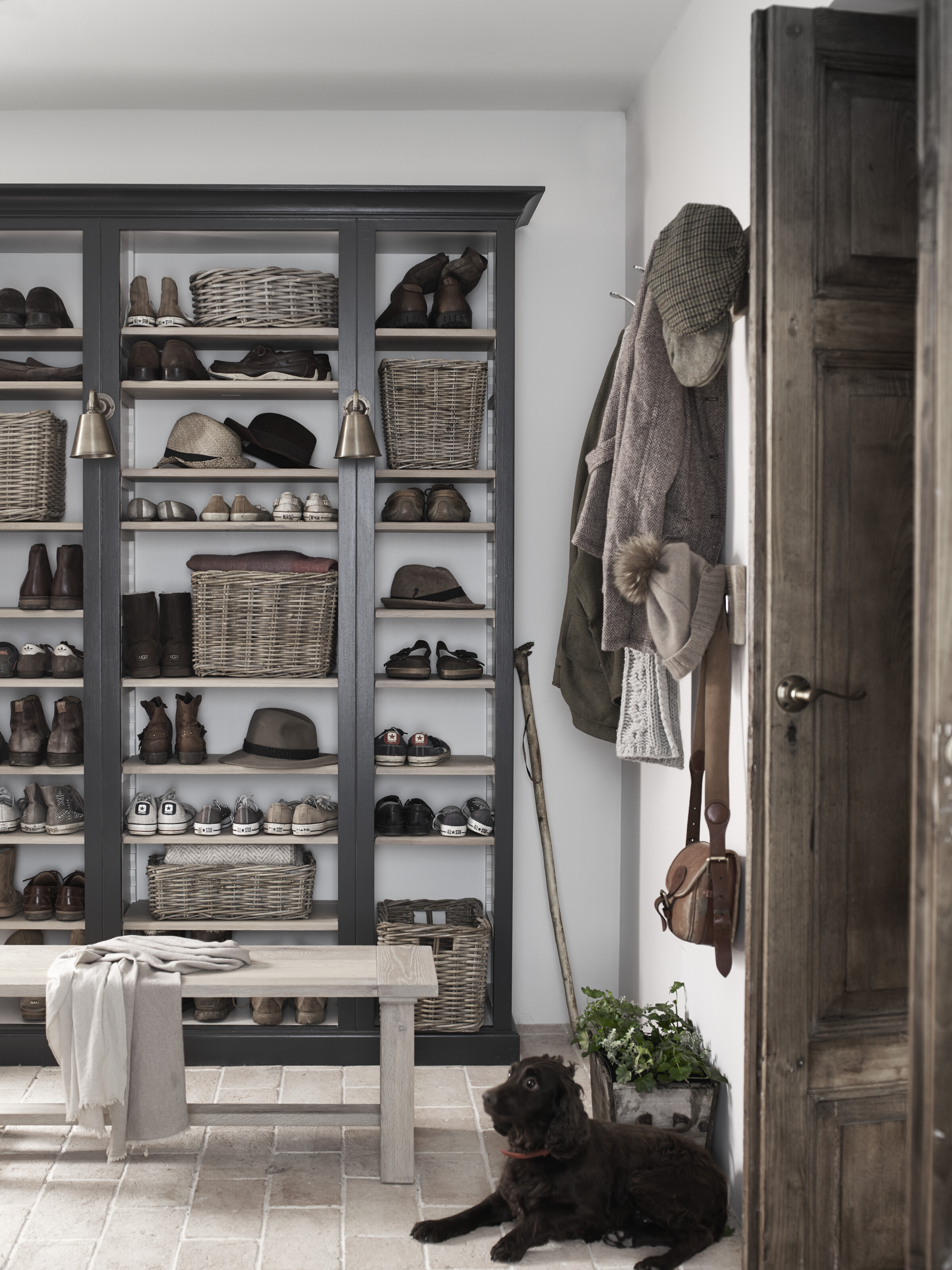
Your mudroom tile ideas might favor natural stone, and with good reason. Natural stone can be extremely hardwearing and able to cope with constant foot traffic, and even the gardening tools and snow shovels you might bring into the space.
As a mudroom gets damp, try opting for a natural stone with a textured rather than smooth surface for best slip-resistance.
Do be mindful, though, that natural stone tile will need regular resealing as it is naturally porous. Consult your supplier to ascertain the particular requirements of the tile you prefer before purchase.
5. Go dark for easy cleaning
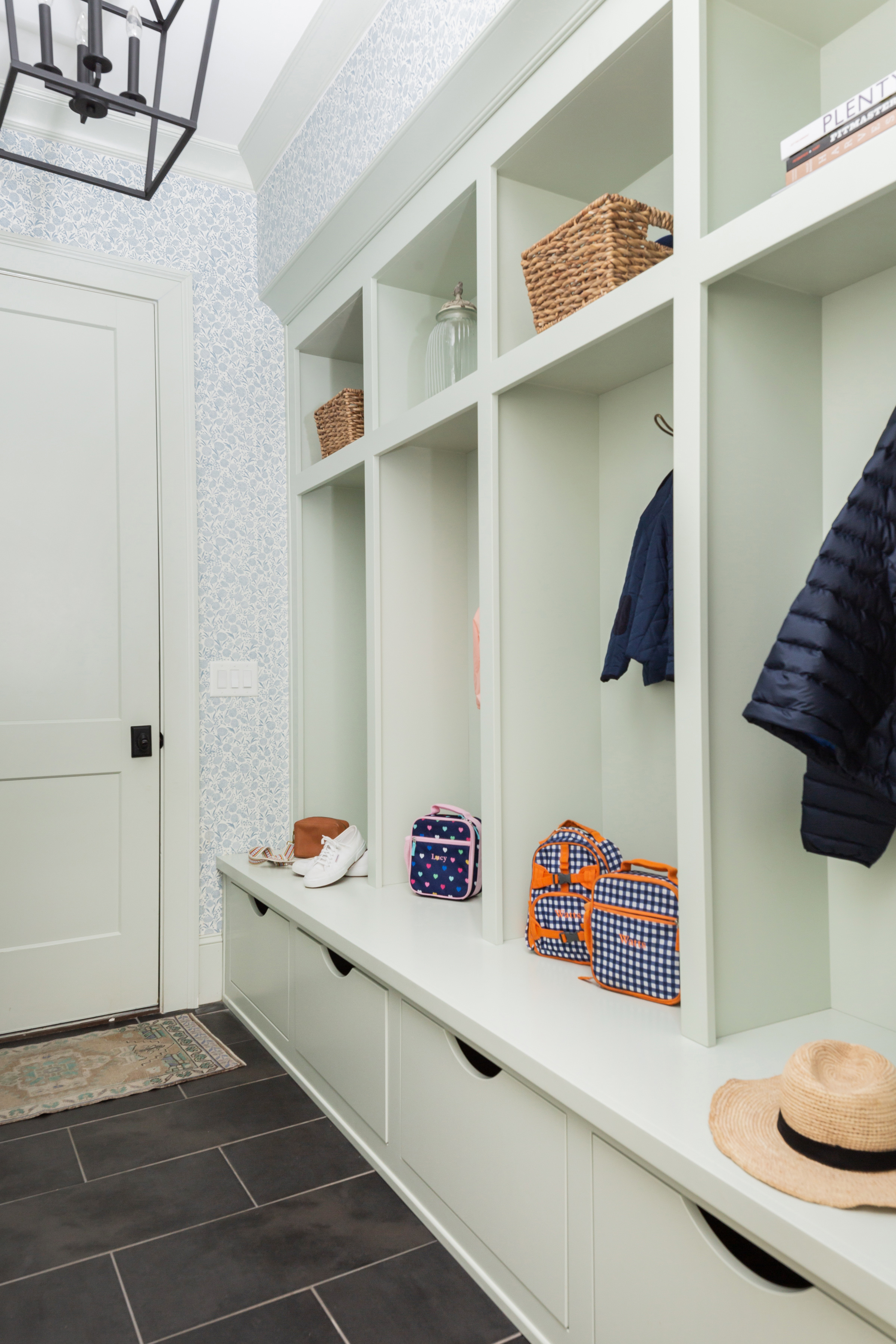
Searching for mudroom tile ideas that will be easy to keep spick-and-span? Think flooring color if sports-loving and outdoorsy family members bring in a whole lot of dirt on their footwear, plus clothing and equipment.
‘I love the look of a bluestone or slate tile, and in this mudroom, the dark color of the tile is not only chic, but hides any evidence from dirty shoes coming through the doors,’ says Maggie Griffin, founder and lead designer of Maggie Griffin Design of this organized space.
6. Make it characterful with brick tile

Brick has a cozy look that can make your mudroom a characterful space. It’s also a great way to echo the material from which a home is made for a cohesive feel. Rather than the real thing, go for brick-style porcelain tile that is easy to lay and straightforward to look after.
The best versions have the varied color tones and detail of aged brick so it will look as if your tile has been a part of your home for many years.
7. Go for a classic black and white combo
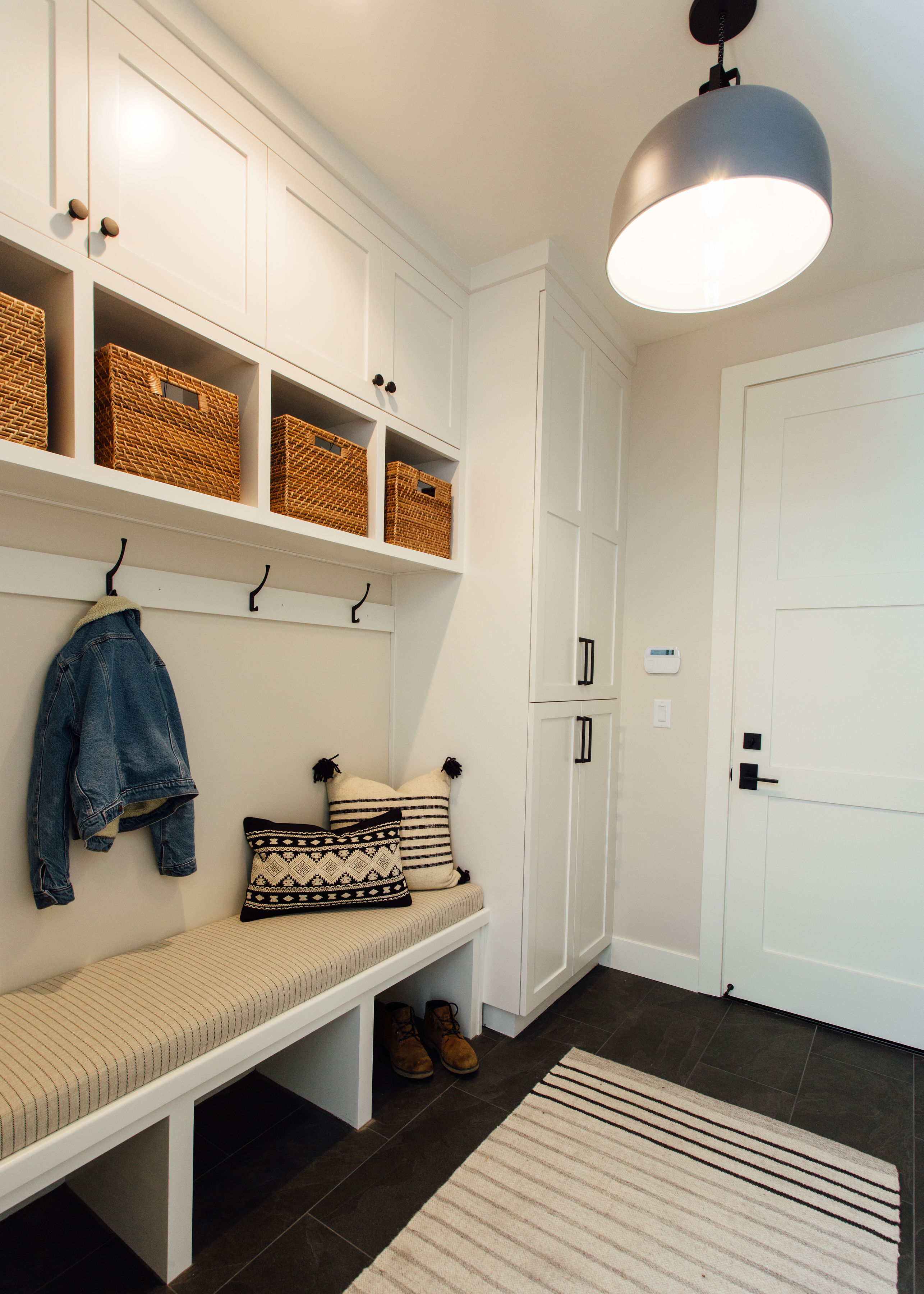
Black and white is an interior color combination that’s enduringly stylish and it’s perfect for a mudroom with black for the floor and white for cabinets, bench seating, baseboards, and the door.
‘We selected a porcelain tile that resembled slate for the floor in this mudroom,’ explains Michelle Lisac, founder and principal designer of Michelle Lisac Interior Design.
‘We chose this particularly dark tile to help hide any mud and dirt but also to contrast the white painted cabinetry. A mudroom requires durable elements that can withstand the daily wear and tear, so we selected a Schumacher indoor/outdoor striped fabric for the bench seat. The baskets were added for warmth and texture, and for each family member to have a place to hold their personal items.’
8. Select large format tile
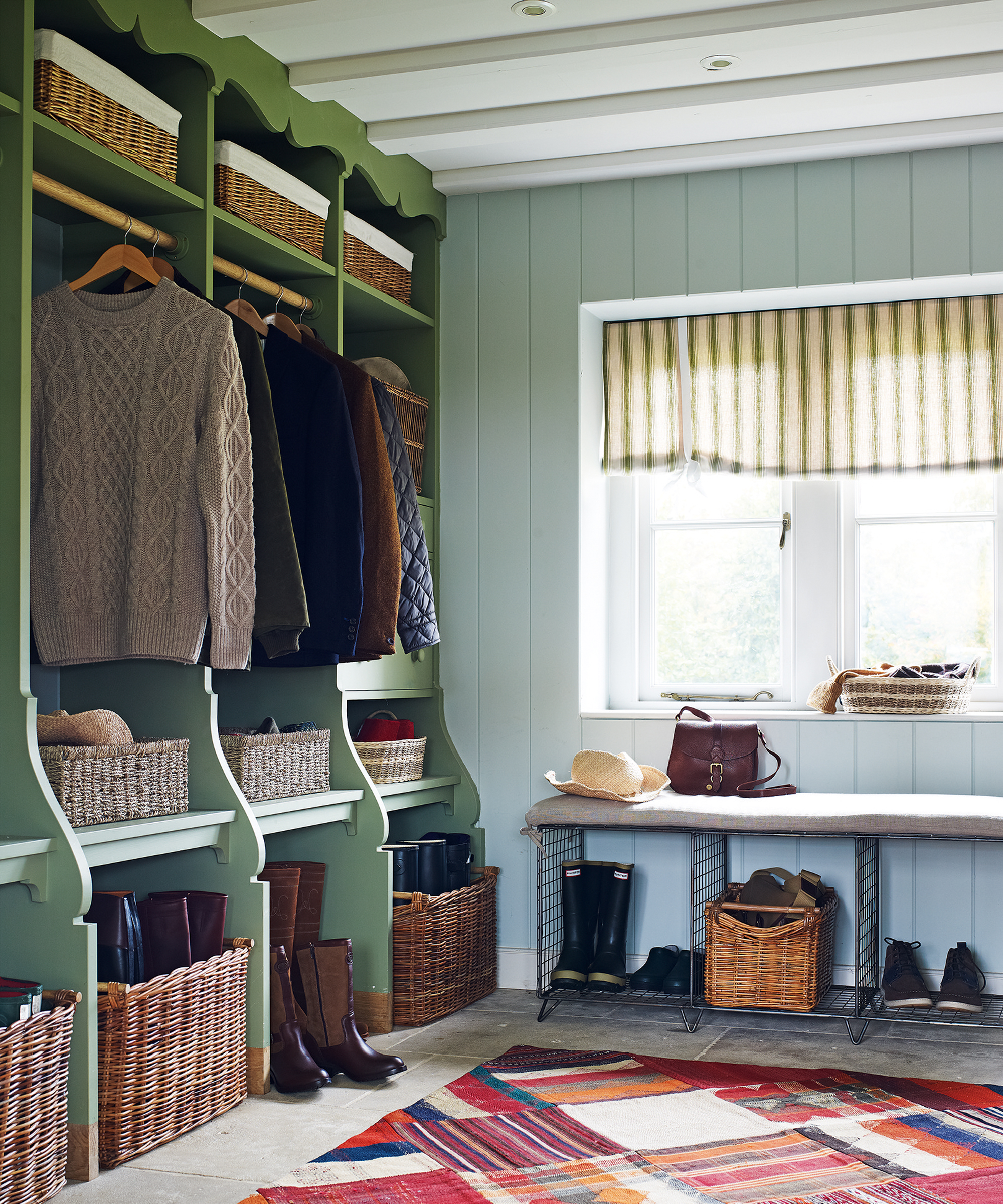
Consider large format mudroom tiles and you’ll end up with fewer grout lines – and less grout to keep clean.
You can also make the job less onerous with your choice of grout color. Try a version just a little darker than the tile, though, as a strong contrast won’t create the effect of a continuous surface thus potentially making the mudroom feel smaller.
The other way to ensure your grout cleaning duties will be kept to a minimum? Lay a hardwearing rug centrally; this one adds a great pop of color.
9. Fall for limestone tile
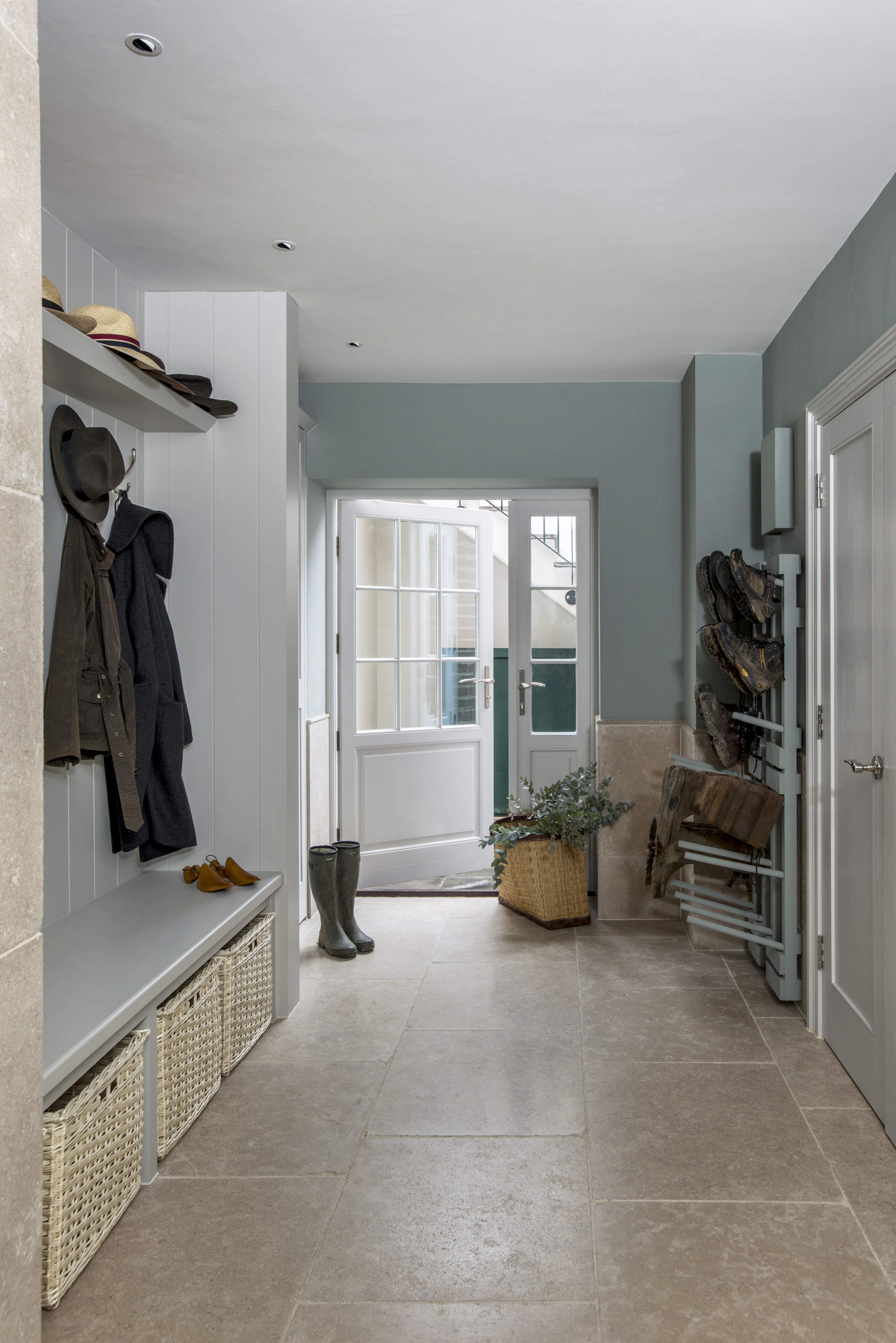
Interior designer Emma Sims-Hilditch of London and Gloucestershire-based Sims Hilditch has created many mudrooms for her clients. She says: ‘We often use hardwearing natural limestone tiles for the flooring in boot or mudrooms because not only is it aesthetically pleasing, but it is durable and easy to clean.’
Emma advises that you shouldn’t be wary about introducing a pale colored tile to a mudroom. ‘We often opt for a lighter color,’ she says. For her, ‘darker tiles tend to make any mud or dirt stains seem more visible’.
10. Bring black and white to the floor
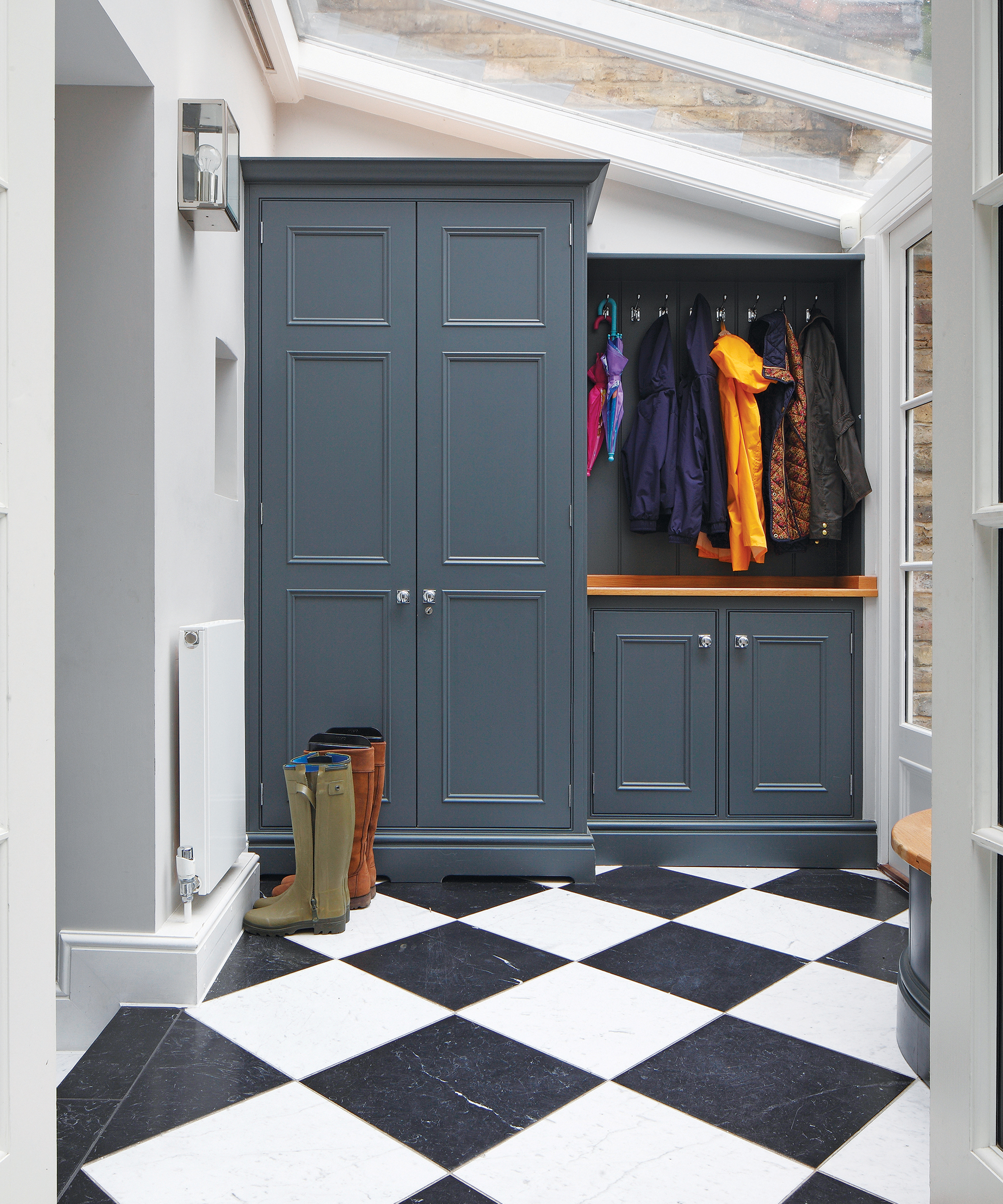
Lay black and white floor tile in a diagonal pattern in a small mudroom, and not only can you get a durable floor, but you can also make the space feel larger than it really is by drawing the eye across it. For this effect, rather than the tile being laid as a grid with squares, each is laid at a 45 degree angle to create a diamond pattern.
A layout like this can also be a sound choice if the walls of the mudroom are out of square, concealing the irregularity.
Which front door entry tile ideas are practical for my mudroom?
Mudroom tile has many of the same demands on it as entryway tile. It needs to be hardwearing to cope with the daily comings and goings of every family member and pets, too. It also needs to be easy to keep clean as dirt will be tracked in on shoes, boots, and paws. And it’s also vital that it can cope with the damp from footwear and also outerwear and umbrellas.
However, just like with front door entry tile, this leaves you with a wide choice of tile, including porcelain, ceramic (but always double check a tile you’ve fallen for is suitable for flooring and not just walls), natural stone including slate, and cement. If you opt for porcelain, ceramic or cement, bear in mind that patterned tile can add a dynamic note to a mudroom just as it can in an entryway.
And if you love the look of hardwood, just like in the entryway, remember that porcelain can reproduce it really effectively, and won’t absorb water.
Should mudroom tiles be sealed regularly?
Mudroom tiles need to be sealed regularly if they are made from natural stone such as slate, granite, travertine, and so on. The reason is that stone is naturally porous and can therefore absorb the moisture that’s brought in on shoes and more; it can also stain.
A mudroom sees lots of foot traffic, so it’s best to reseal the tile annually here. Always make sure you are using a suitable sealer for your particular stone type; your supplier can advise.

Sarah is a freelance journalist and editor. Previously executive editor of Ideal Home, she’s specialized in interiors, property and gardens for over 20 years, and covers interior design, house design, gardens, and cleaning and organizing a home for Homes & Gardens. She’s written for websites, including Houzz, Channel 4’s flagship website, 4Homes, and Future’s T3; national newspapers, including The Guardian; and magazines including Future’s Country Homes & Interiors, Homebuilding & Renovating, Period Living, and Style at Home, as well as House Beautiful, Good Homes, Grand Designs, Homes & Antiques, LandLove and The English Home among others. It’s no big surprise that she likes to put what she writes about into practice, and is a serial house renovator.